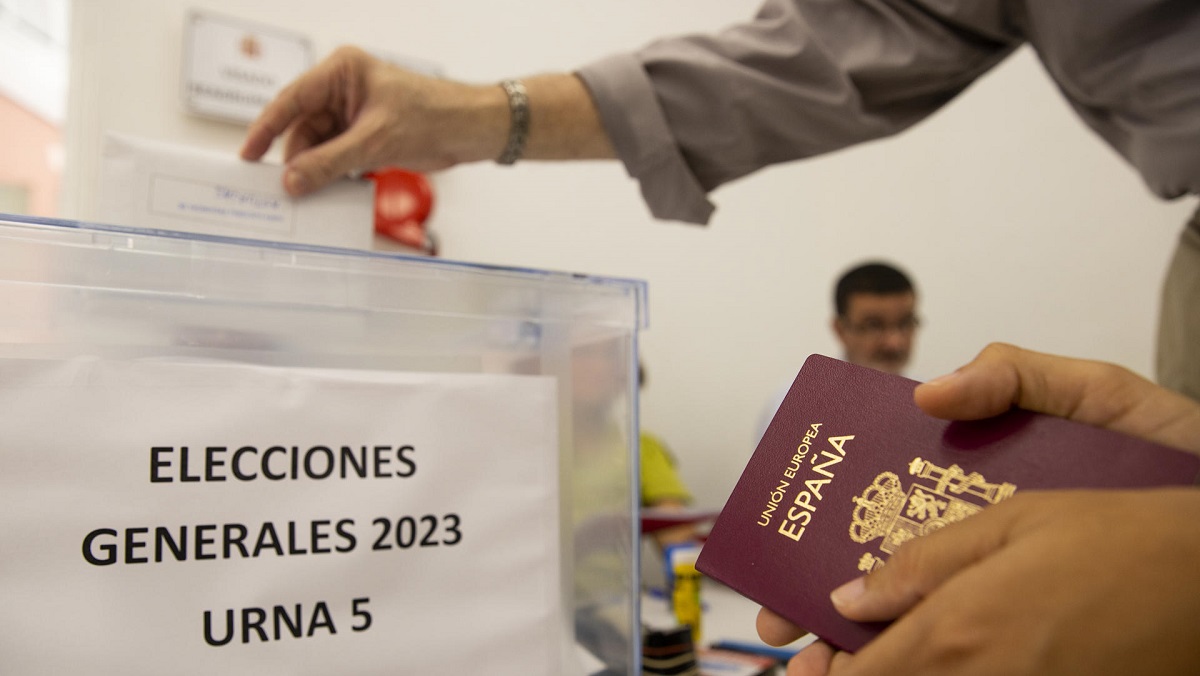
1.
It is sunday july 23 the general elections in the Spanish State that will define the Cortes and the new president of the government. A total of 37,466,432 people are called to vote this Sunday, of which 35,141,122 reside in the country and 2,325,310 abroad.
Las last elections generals were held in November 2019 after two years of crisis with motions of no confidence, and the impossibility of forming a government because no party or coalition achieved a parliamentary majority. Finally in November 2019 A coalition between Pedro Sánchez’s PSOE and Pablo Iglesias’ Unidas Podemos achieved a majority. In this government coalition, the neo-reformist formation Unidos Podemos took control of five ministries co-governing from that moment with the PSOE and holding the position of second vice president: at first it belonged to Pablo Iglesias himself and is currently held by Yolanda Díaz.
In the elections this Sunday, that progressive bloc intends to repeat the coalition now between the PSOE and the new platform of the reformist left now headed by Yolanda Diazand called by the name of summer.
2.
The call for elections of this Sunday 23J was the direct result of the political crisis opened by the result of the municipal and regional elections of May 28 of this year, in which the right advanced at the cost of disenchantment with “progressivism”. Given the unmitigated setback of the PSOE and Unidas Podemos in the May 28 elections, which left most of the territory in the hands of the right, President Pedro Sánchez gave a coup d’état by advancing the general electionsscheduled for the end of the year, to July 23.
The advance of the right and the electoral advance of the generals to 23J bring the possibility of a government of the right-wing Popular Party (PP) and together with the far-right Vox.
for his part “progressivism” proposes as a way out to revalidate its coalition government (now between the PSOE and Sumar) in an even more conservative political framework after having left unresolved the main social demands and democracies of the working class and popular sectors and even, on some key issues, having assumed a large part of the right-wing agenda.
3.
most of the polls until Monday (last legal day for opinion polls to be published) give the PP the winner. According to the average of DatosRTVE polls, the PP would obtain 34.5% of the votes and 142 seats. If this is confirmed, there would be 53 deputies and 14 points more than those obtained in the 2019 general elections. According to this same average, Vox would get about 36 seatsso both parties would add 178 seats, thus surpassing in coalition the absolute majority of 176, with which they could form a government.
The PP has made an effort in this campaign to attract Vox voters from the right and PSOE voters from the political center, to achieve an absolute majority of their own, without depending on the support of Vox to form a government. Until Sunday It will not be known if he will be able to achieve it.
According to this same study by Spanish Radio and Television, the PSOE would be in second place with 28.5% of the votes and 106 seats (14 deputies less than now and almost the same percentage of the vote as in 2019). summerthe neo-reformist project led by the current Vice President and Minister of Labor Yolanda Díaz, would be disputing third place, close to 12.8%, while Vox could fall behind in percentages, but surpass them in seats (36 for Santiago Abascal’s party, 33 for Yolanda Díaz’s coalition).. If these data are confirmed, Sumar would be behind the results that United We Can have in 2019, when it obtained 35 deputies. In that case, the progressive block would not exceed 139 deputies, below the 155 that PSOE and Unidas Podemos added in November 2019.
4.
Although the polls have been very wrong in recent years, everything seems to indicate the probable triumph of the right. But, the question remains of to what extent the formation of the government will depend on the support of Vox. In the last two months, the PP has formed municipal and regional governments in coalition with Vox in more than 140 cities and regions with an anti-rights program, anticipating what may come after Sunday, with a government of the right that will seek to apply an agenda of greater adjustments and reactionary attacks.
At the same timeboth the demands of the EU and the increasingly conservative profile of both the PSOE and the new brand of neo-reformism, Sumar, predict that If the “progressive” government repeats itself, it will also deploy an agenda of adjustments and attacks. In fact, the progressive government has already committed itself to the European Union cut 20,000 million euros in spending after the elections.
5.
The campaign for the vote for the “lesser evil” to stop the right has marked these two months. A large part of the left and social movements have made it their own. What emerges from electoral trends, however, is that what has facilitated the rise of the right is the experience of the last years of the “progressive” government, in which the essentials of neoliberal policies have been maintainedthe preservation of the ’78 regime inherited from Francoism and imperialist Europe.
This dynamic is what has allowed the extreme right and the right to capitalize in a reactionary way part of the social discontent with the government, targeting the most precarious sectors of the working class and migrants, and targeting especially in a reactionary way against the rights of trans people, LGTBI and feminism.
6.
The disappointments and Frustrations with the progressive government, within the framework of the increase in inflation, the rise in rates and rents, the housing crisis, or the persistence of repressive laws such as the gag law, has generated broad political disaffection among many who had previously voted for the social liberal left or the reformists.
The high abstention rate on May 28, particularly in the working-class neighborhoods and areas with weight of the Catalan independence movement, were a sign of the growing disaffection with the two great political mediations that arose as a diversion from the process of the indignados of 15M and the Catalan process and its independence struggle.
Within the framework of a strong campaign by the media related to the government and broad sectors of the social movements and the institutional left promoting the vote for the progressive bloc, the majority of the extreme left has been divided between calls to vote for reformism or not to pronounce on the question of the vote.
Organizations like the Revolutionary Current of Workers and Workers (CRT), part of the International Network La Izquierda Diario, however, has raised the need to defend a political-electoral position of class independence promoting null voting or abstention.
Faced with the advance of the right and the bankruptcy of “progressivism” in power, It is urgent to set up a left that openly defends an anti-capitalist transitional program, centered on the development of the class struggle and the prospect of fighting for workers’ governments and a socialist society..
Source: www.laizquierdadiario.com

